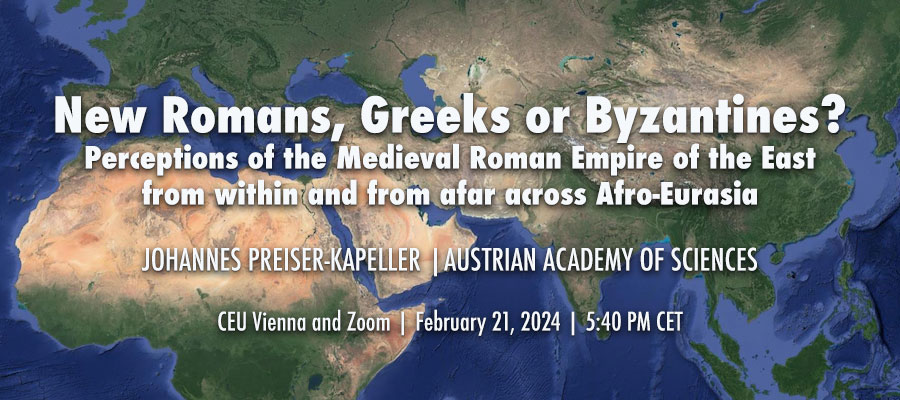New Romans, Greeks or Byzantines? Perceptions of the Medieval Roman Empire of the East from within and from afar across Afro-Eurasia, lecture by Johannes Preiser-Kapeller (Austrian Academy of Sciences), CEU Vienna and Zoom, February 21, 2024, 5:40 PM CET
The identity and self-identification of the inhabitants of the medieval Roman Empire of the East, but also its labelling in past and modern historiography, have become quite contested topics in recent years. These discussions mix not least with traditional national and religious discourses and more recent “postcolonial” debates.
Based on my own attempt to write a monograph on the history of “Byzantium” and considering other recent publications, the talk connects these issues with a wider view on the horizons of Roman/“Byzantine” imperial ideology. In particular, it focuses on perspectives on the Roman Empire of the East from “outside” of the dominant discourse of Greek-speaking elites in Constantinople, especially from its eastern neighbours near and afar.
These include voices from Armenian historiography, often written from the position of “victims” of Romans' politics. Furthermore, the talk explores the integration of “Rum” among the empires of Afro-Eurasia in Persian and Arab texts and its reception in Central Asia and China. It becomes evident that the answer to the question “Romans, Greeks or Byzantines?” was far from clear for the empire´s contemporaries. Hence, it could be discussed in a more relaxed way also in present scholarship.
Johannes Preiser-Kapeller is deputy head of the Department for Byzantine Research at the Institute for Medieval Research of the Austrian Academy of Sciences and teaches Byzantine and Global History at the University of Vienna. His research focuses on the entanglements of Byzantium in the Afro-Eurasian World, environmental and climate history and complexity and network studies.
